Related Research Articles
Social credit is a distributive philosophy of political economy developed in the 1920s and 1930s by C. H. Douglas. Douglas attributed economic downturns to discrepancies between the cost of goods and the compensation of the workers who made them. To combat what he saw as a chronic deficiency of purchasing power in the economy, Douglas prescribed government intervention in the form of the issuance of debt-free money directly to consumers or producers in order to combat such discrepancy.
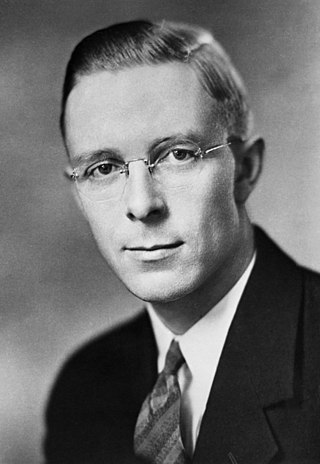
Ernest Charles Manning was a Canadian politician and the eighth premier of Alberta between 1943 and 1968 for the Social Credit Party of Alberta. He served longer than any other premier in the province's history and was the second longest-serving provincial premier in Canadian history.
The Progressive Party of Canada, formally the National Progressive Party, was a federal-level political party in Canada in the 1920s until 1930. It was linked with the provincial United Farmers parties in several provinces, and it spawned the Progressive Party of Saskatchewan, and the Progressive Party of Manitoba, which formed the government of that province. The Progressive Party was part of the farmers' political movement that included federal and provincial Progressive and United Farmers' parties.

The British Columbia Social Credit Party was a conservative political party in British Columbia, Canada. It was the governing party of British Columbia for all but three years between the 1952 provincial election and the 1991 election. For four decades, the party dominated the British Columbian political scene, with the only break occurring between the 1972 and 1975 elections when the British Columbia New Democratic Party governed. Party member were known as Socreds.
The Canadian social credit movement is a political movement originally based on the Social Credit theory of Major C. H. Douglas. Its supporters were colloquially known as Socreds in English and créditistes in French. It gained popularity and its own political party in the 1930s, as a result of the Great Depression.

Alberta Social Credit was a provincial political party in Alberta, Canada, that was founded on social credit monetary policy put forward by Clifford Hugh Douglas and on conservative Christian social values. The Canadian social credit movement was largely an out-growth of Alberta Social Credit. The Social Credit Party of Canada was strongest in Alberta, before developing a base in Quebec when Réal Caouette agreed to merge his Ralliement créditiste movement into the federal party. The British Columbia Social Credit Party formed the government for many years in neighbouring British Columbia, although this was effectively a coalition of centre-right forces in the province that had no interest in social credit monetary policies.

The Social Credit Party of Canada, colloquially known as the Socreds, was a populist political party in Canada that promoted social credit theories of monetary reform. It was the federal wing of the Canadian social credit movement.
The Manitoba Social Credit Party was a political party in the Canadian province of Manitoba. In its early years, it espoused the monetary reform theories of social credit.

The Social Credit Party of Great Britain and Northern Ireland was a political party in the United Kingdom. It grew out of the Kibbo Kift, which was established in 1920 as a more craft-based alternative for youth to the Boy Scouts.

The 1967 Alberta general election was held on May 23, 1967, to elect members of the Legislative Assembly of Alberta to the 16th Alberta Legislature. The election was called after the 15th Alberta Legislature was prorogued on April 11, 1967, and dissolved on April 14, 1967.

The 1971 Alberta general election was the seventeenth general election held in the Province of Alberta, Canada on August 30, 1971, to elect seventy-five members of the Alberta Legislature to form the 17th Alberta Legislative Assembly.
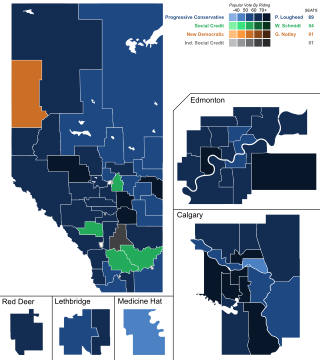
The 1975 Alberta general election was held on March 26, 1975, to elect members of the Legislative Assembly of Alberta to the 18th Alberta Legislature. The election was called on February 14, 1975 prorogued and dissolved of the 17th Alberta Legislature.
The Alberta Unity Movement, also known as the Independent Movement and later the Independent Citizen's Association, the People's League, was a political movement and lobby group in Alberta, Canada formed in 1937 in an attempt to unite the opposition against the Social Credit government of William Aberhart. It was created as a lobby group to promote independent candidates before the 1940 general election. The Conservative and Liberal parties, and the more conservative remnants of the United Farmers, recognizing the widespread popularity of the Social Credit party, ran joint candidates as independents in what was called the "Independent Movement" or the "Unity Movement". Calgary mayor Andrew Davison was named leader.
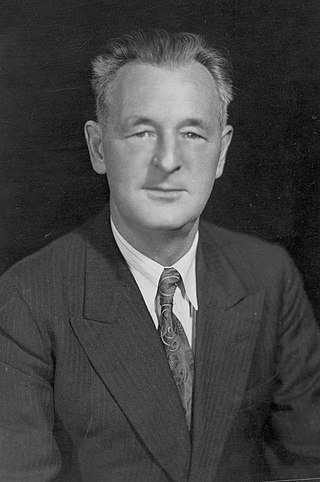
William Irvine was a Canadian politician, journalist, and clergyman. He served in the House of Commons of Canada on three occasions, as a representative of Labour, the United Farmers of Alberta, and the Co-operative Commonwealth Federation. During the 1920s, he was active in the Ginger Group of radical Members of Parliament (MPs).

The leader of the Official Opposition, formally known as the leader of His Majesty's Loyal Opposition, is the member of the Legislative Assembly (MLA) who leads the Official Opposition, typically the second largest party in the provincial legislature.
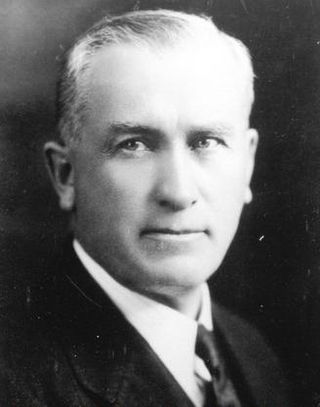
David Milwyn Duggan was a Welsh-born Canadian politician who was the Mayor of Edmonton from 1920 to 1923, a member of the Legislative Assembly of Alberta, and a leader of the Conservative Party of Alberta.

John Farquhar Lymburn was a Canadian politician who served as Attorney-General of Alberta from 1926 until 1935. Born and educated in Scotland, he came to Canada in 1911 and practiced law in Edmonton. In 1925, John Edward Brownlee became Premier of Alberta, and sought a lawyer without partisan affiliation to succeed him as attorney-general. Lymburn accepted the position, and was elected to the Legislative Assembly of Alberta in the 1926 election. As attorney-general, Lymburn took part in negotiations between the Alberta and federal governments over natural resource rights, prepared Alberta's submission in the Persons case, and played a minor role in the sex scandal that forced Brownlee from office. In the 1935 provincial election, Lymburn and all other United Farmers of Alberta candidates were defeated, as William Aberhart led the Social Credit League to victory. Lymburn made an unsuccessful attempt to return to the legislature in 1942, and briefly returned to prominence during the Bankers' Toadies incident, before dying in 1969.

The 1937 Social Credit backbenchers' revolt took place from March to June 1937 in the Canadian province of Alberta. It was a rebellion against Premier William Aberhart by a group of backbench members of the Legislative Assembly (MLAs) from his Social Credit League. The dissidents were unhappy with Aberhart's failure to provide Albertans with CA$25 monthly dividends through social credit as he had promised before his 1935 election. When the government's 1937 budget made no move to implement the dividends, many MLAs revolted openly and threatened to defeat the government in a confidence vote.
The Social Credit Board was a committee in Alberta, Canada from 1937 until 1948. Composed of Social Credit backbenchers in the Legislative Assembly of Alberta, it was created in the aftermath of the 1937 Social Credit backbenchers' revolt. Its mandate was to oversee the implementation of social credit in Alberta. To this end, it secured the services of L. Dennis Byrne and George Powell, two lieutenants of social credit's British founder, C. H. Douglas.
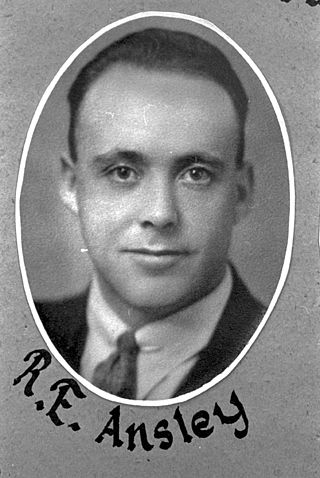
Ronald Earl Ansley was a provincial politician from Alberta, Canada. He served as a member of the Legislative Assembly of Alberta from 1935 to 1963 sitting with the Social Credit caucus in government and as an Independent.
References
- Barr, John J. (1974). The Dynasty: The Rise and Fall of Social Credit in Alberta. Toronto: McClelland and Stewart Limited. pp. 100, 111. ISBN 0-7710-1015-X.